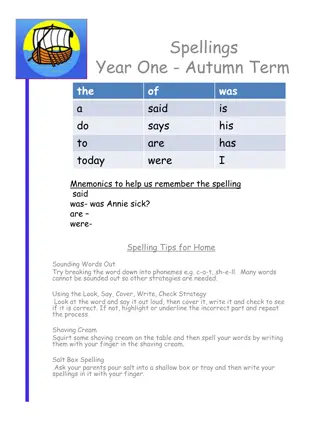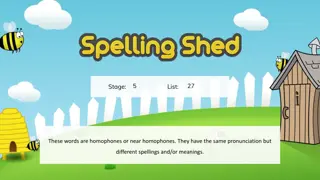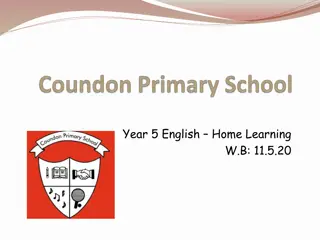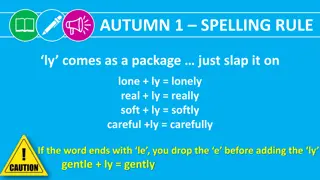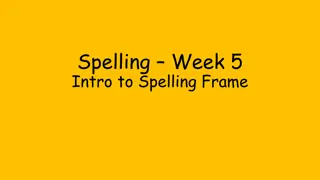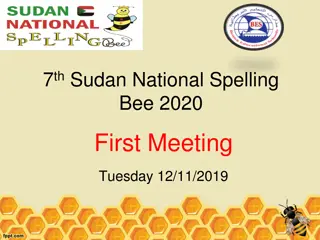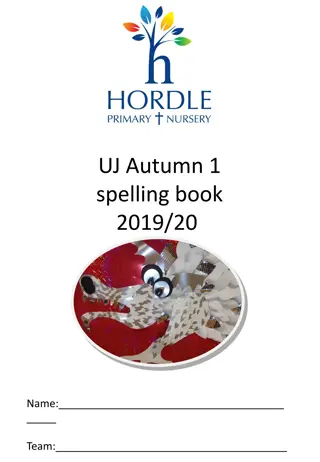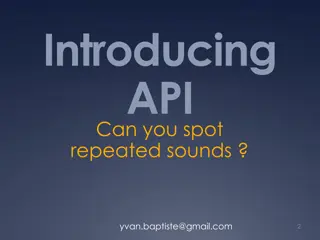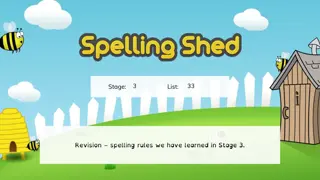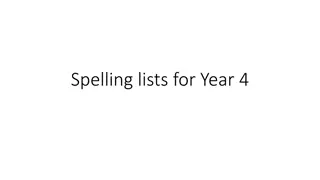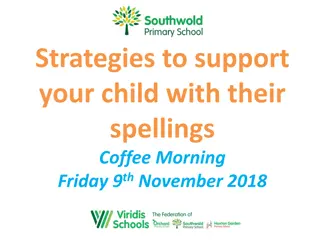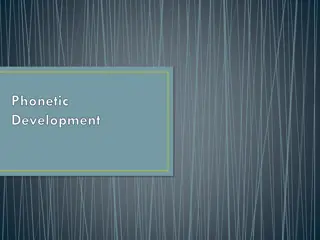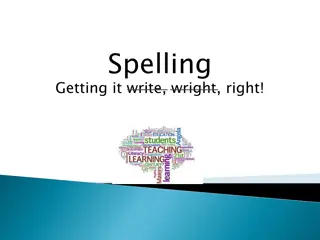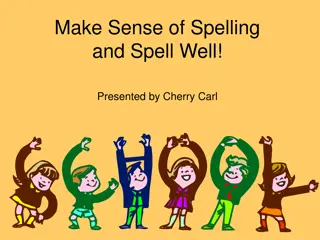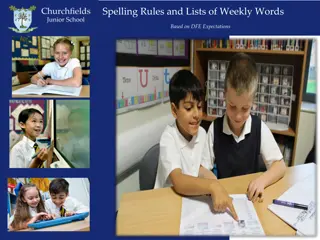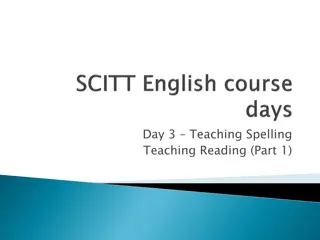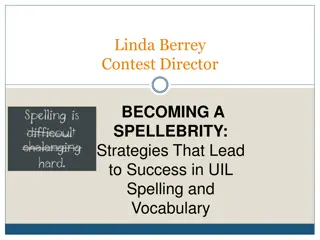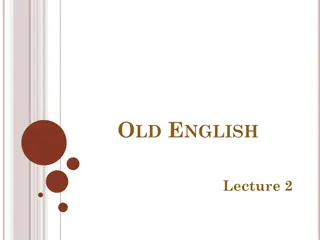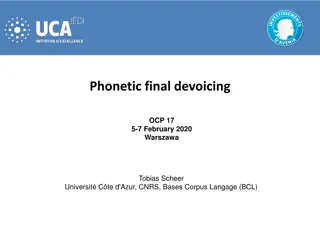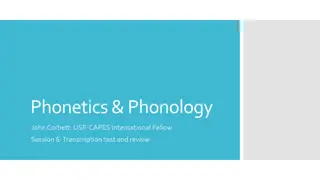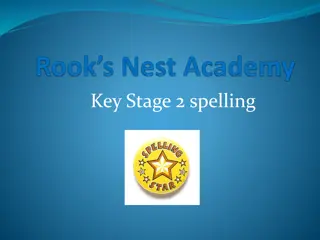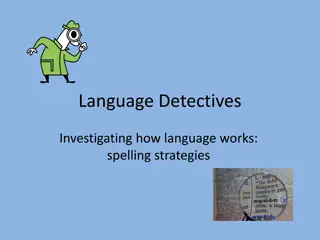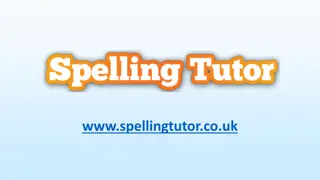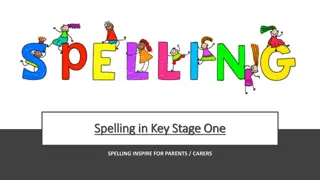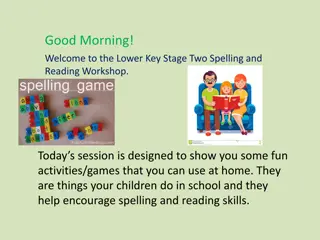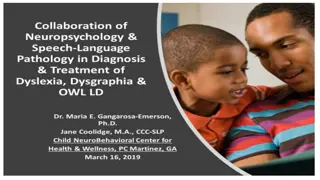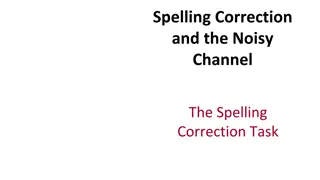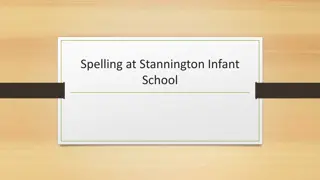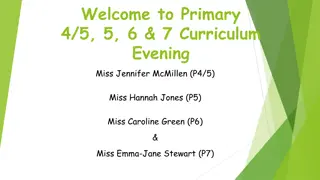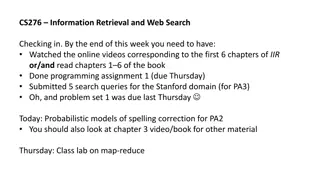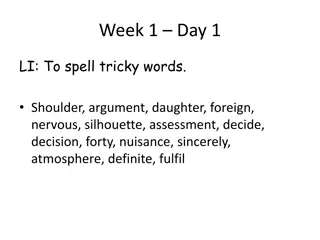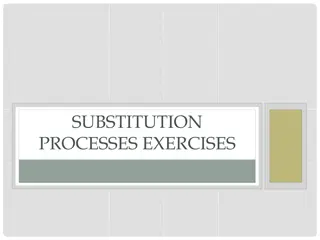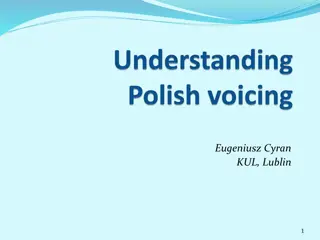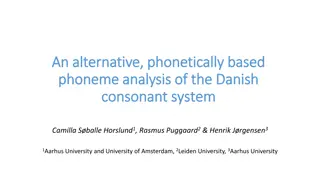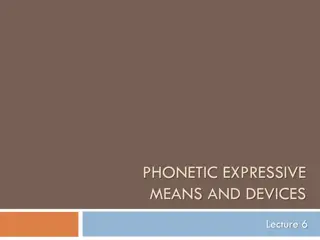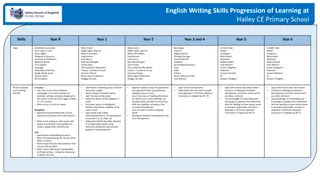Fun Spelling Strategies for Young Learners
Engage your child in creative and interactive spelling activities with mnemonics and tips like sounding out words, using the Look, Say, Cover, Write, Check strategy, and tactile methods such as Shaving Cream and Salt Box Spelling. Explore simple sentence writing and mnemonics to reinforce spelling s
0 views • 18 slides
Fun with Homophones: Learn and Test Your Spelling Skills
Explore homophones and near-homophones with this engaging lesson plan. Children will learn how words can sound alike but have different meanings and spellings. Through interactive activities and spelling tests, they will enhance their vocabulary and spelling accuracy.
0 views • 17 slides
Year 5 English Home Learning - Spelling and Balanced Argument Activities
Explore Year 5 English home learning activities for the week, including a spelling lesson using Oxford Owl, practicing challenging words, and planning a balanced argument on whether mobile phones should be allowed in school. Enhance your spelling skills and critical thinking through engaging tasks a
1 views • 20 slides
Spelling Rules for Different Seasons
Learn essential spelling rules for autumn, spring, and summer with examples like adding -ly, i before e, dropping silent e, pluralizing y, and doubling consonants before suffixes. Enhance your spelling skills with these easy-to-follow guidelines.
1 views • 6 slides
Explore Spelling Frame for Effective Spelling Practice
Start using Spelling Frame to enhance your spelling skills. Learn, practice, and test your spellings weekly on SMHW. Get personalized spelling lists, follow steps to log in, practice, and earn points for improvement.
2 views • 8 slides
7th Sudan National Spelling Bee 2020: First Meeting Agenda and Winners
The 7th Sudan National Spelling Bee 2020 is set to kick off with its first meeting on Tuesday, 12/11/2019. The agenda includes discussions on the previous year's event, insights from the Intercontinental and African Spelling Bees, as well as unveiling the venue, dates, and format for this year's com
3 views • 29 slides
Spelling and Handwriting Practice for Upper Juniors
Develop your spelling skills through practice with homophones, spelling rules, and Y5/6 word list words. Enhance joined writing techniques with effective strategies like air-writing and the Quadrant Method. Stay engaged with various activities like writing in alphabetical order, using words in sente
0 views • 30 slides
Week 8 Spelling Activities and Language Features in an Informative Text
Engage in Week 8 spelling exercises by recording and practicing words, followed by completing spelling activities. Enjoy a fruit break for rejuvenation, then dive into reading works and comprehension tasks. Explore language features of informative texts including technical vocabulary and proper noun
0 views • 40 slides
Spot Repeated Sounds in Introducing API and Word Lists
In this collection, you can spot repeated sounds within phrases presented as images. From identifying repeated sounds in API introductions to word lists, this visual exercise aims to enhance your auditory recognition skills and phonetic awareness. Explore the images to test your ability to recognize
0 views • 49 slides
Stage 3 Spelling Rules Revision - Activities and Answers
This resource provides a comprehensive revision of spelling rules learned in Stage 3. It includes lists of challenging words, fun activities like unscrambling hidden spellings, and their corresponding answers. Enhance your spelling skills with this engaging material.
0 views • 5 slides
Year 4 Spelling Lists and Patterns for Weekly Lessons
Attached are the spelling lists for Year 4 covering various patterns, homophones, prefixes, and suffixes. Students are expected to learn these spellings weekly for dictation tests on Fridays. Additional words are included to reinforce the spelling rules. The lists also focus on adding suffixes, pref
0 views • 5 slides
Effective Strategies to Improve Your Child's Spelling Skills
Empower your child with practical techniques to tackle challenging spellings. Highlight tricky parts, create mnemonic devices, break down polysyllabic words, practice recall exercises, and use visual imagery to enhance spelling retention. Join the Coffee Morning on Friday, 9th November 2018, for val
0 views • 15 slides
Infant Phonetic Development: Stages and Characteristics
Infant phonetic development progresses through distinct stages, from basic biological noises like crying to babbling and beyond. Each stage highlights vocal milestones such as cooing, vocal play, and babbling, leading to the expansion and contraction of phonemes. The transition to melodic utterance
0 views • 5 slides
Improving Spelling Skills for Better Learning
Enhancing spelling skills is crucial for academic success. The program highlights the evolution of spelling education, emphasizing the progression from limited reinforcement to daily, multi-sensory teaching methods. Structured stages, such as Stage 1 focusing on initial sounds and phonemes, facilita
0 views • 48 slides
Exciting Spellings and Phonics Activities for Primary 5 Students
Engage your Primary 5 students in a fun and interactive week of spellings and phonics. Explore different sounds, spellings, and words while enhancing phonetic skills. Dive into themed activities and challenge your students with creative tasks. Don't miss out on the engaging story sessions designed t
0 views • 15 slides
Enhancing Spelling Skills in the New Primary Curriculum
Implications and changes in spelling education, support strategies for parents, analysis of letter order impact, diagnostic testing for progress tracking, increased expectations on spelling rules, word origins, and demanding word lists, focus on phonics and compound words, rules for verb tenses, plu
0 views • 16 slides
Understanding Effective Spelling Instruction Methods
English spelling makes sense most of the time, connecting related words in both meaning and spelling. Research emphasizes that effective spelling instruction supports reading development and word knowledge. Spelling in middle grades bridges vocabulary learning, and assessments help pinpoint students
0 views • 24 slides
Spelling Rules and Lists for Year 3 and Year 4 Autumn Terms
Explore spelling rules and lists for Year 3 and Year 4 Autumn Terms. Covering topics such as double letters, silent letters, the 'ate' sound, plural nouns, and more. The resources provide guidance on common spellings and words to enhance spelling skills in line with DFE expectations.
0 views • 25 slides
Exploring Effective Phonics Teaching and Spelling Conventions through History
Explore the development of effective phonics teaching and spelling conventions through reflective logs and historical context. Discover the impact of phonics sessions on understanding and teaching practices, delving into Old English to modern-day practices. Learn about the evolution of language and
0 views • 57 slides
Strategies for Success in UIL Spelling and Vocabulary Contests
Strategies for achieving success in UIL Spelling and Vocabulary contests are highlighted in this content. It emphasizes the importance of correct spelling, the significance of vocabulary proficiency, and the role of precise language in effective communication. Insights from renowned figures like Mar
2 views • 115 slides
Understanding Old English: Background, Alphabet, and Phonetics
Delve into the world of Old English with a focus on its general background, unique alphabet, and phonetic system. Explore the evolution of written records, the transition from runes to Latin letters, and the phonetic principles that governed Old English writings. Uncover the rich history and linguis
0 views • 26 slides
Understanding Phonetic Final Devoicing and Its Implications in Phonological Theory
Phonetic Final Obstruent Devoicing (FOD) challenges traditional phonological theories by presenting instances where devoicing cannot be purely phonological but must be phonetic in nature. This phenomena is evident in Proto- and Old French where word-final consonants devoice despite having intervocal
0 views • 30 slides
Phonetics and Phonology Workshop Session: Transcription Test and Review
In this workshop session led by John Corbett, participants engage in a transcription test followed by a review of course content. The session focuses on peer-marking and improvement of transcription skills using examples like "CHEESE AND BISCUITS." Participants also learn about alternative pronuncia
0 views • 17 slides
Rotary Memories: Dr. Mike Gass and the Spelling Bee Journey
Dr. Mike Gass has been an active participant in various spelling bee events over the years, including the Rotary Memories Spelling Bee, Silverdale Rotary Club events, and the Literacy Council Spelling Bee. His dedication to these events alongside friends and supporters has made a lasting impact on t
0 views • 8 slides
Understanding the Process of Learning Spelling in Key Stage 2
Spelling psychologists have debunked the theory of rote visual memory in children's spelling. Instead, understanding key processes and word structures is crucial. Rooks Nest Academy emphasizes teaching spelling patterns through short daily activities. Year by year, students learn to spell with prefi
0 views • 9 slides
Effective Spelling Strategies for Learning and Remembering Tricky Words
Learn effective spelling strategies to tackle tricky words such as "environment," "science," "definite," and more. Discover techniques like breaking words down, creating memory tricks, identifying word stems, and using the look-say-cover-write-check method to enhance spelling proficiency. Improve yo
0 views • 10 slides
Effective Learning Strategies for Spelling Improvement
Spelling Tutor is a specialized program designed for students with SEN/SpLD/Dyslexia focusing on teaching the first 1,000 most frequently used words and emphasizing memory exercises for spelling retention. The program avoids explicit phonics instruction and rules to encourage fluent writing. Learn h
0 views • 15 slides
Spelling Inspiration for Parents and Carers at St. Oswald's
Explore how spelling and phonics are taught at St. Oswald's School, including the use of the Read, Write, Inc. Spelling Programme and weekly assessments. Discover tips for reinforcing spelling at home and supporting your child's learning journey in phonics and spelling. Stay engaged and informed to
0 views • 13 slides
Lower Key Stage Two Spelling & Reading Workshop Activities
Explore engaging spelling and reading activities to enhance your child's skills at home. Discover word unscramble games, complete the table exercises, missing letters challenges, word art creations, mnemonics, and classic games like hangman and noughts and crosses. Try these fun activities using com
0 views • 17 slides
Understanding Dysgraphia, Dyslexia, and OWLLD
Dysgraphia, dyslexia, and oral and written language learning disability (OWLLD) are distinct learning challenges affecting different areas of language processing. Dysgraphia primarily impacts spelling and handwriting due to motor memory and visual spelling issues. Dyslexia involves difficulties in p
0 views • 8 slides
Understanding Spelling Correction Through the Noisy Channel Model
Explore the fascinating world of spelling correction using the Noisy Channel Model, which involves tasks such as error detection, correction, types of errors, rates of errors, and strategies for non-word and real-word spelling errors. Learn about applications and implications in various contexts suc
0 views • 51 slides
Supporting Your Child's Spelling Skills at Home
Enhance your child's spelling abilities with fun games and helpful approaches. Starting with basic words, progress to more complex spellings using phonemes, graphemes, and diagraphs. Encourage letter recognition and word formation using playful activities like letter sorting and circle spellings. Fo
0 views • 18 slides
Primary 4-7 Curriculum Evening Overview and Spelling Policy Update
Explore the curriculum evening details for Primary 4/5, 5, 6, and 7 with insights on the revised spelling policy, numeracy strategies, health and wellbeing, and online learning. Discover the school's vision for enhancing learners' spelling abilities through differentiated approaches. Learn about the
0 views • 23 slides
Spelling Correction Techniques and Models in Information Retrieval
Explore the world of spelling correction through the lens of Information Retrieval and Web Search. Dive into probabilistic models, non-word and real-word spelling errors, rates of spelling errors, correction strategies, and more. Gain insights from Christopher Manning on applications, types of error
0 views • 48 slides
Spelling and Phonics Practice Schedules for Improved Vocabulary
Enhance your vocabulary and spelling skills with a structured weekly plan focusing on tricky words, syllables, phonemes, and spelling strategies. Each day targets specific areas such as homophones, phonemic awareness, and effective spelling techniques to help you master challenging words effortlessl
0 views • 16 slides
Phonetic Processes Exercises for Linguistics Students
Practice identifying phonetic processes such as stridency deletion, stopping, fronting, and more with exercises involving target words. Determine which processes apply to various words and mark the likely processes for specific targets. Enhance your understanding of substitution processes in linguis
0 views • 5 slides
Understanding Phonetic and Phonological Properties of Voicing in Polish Language
Explore the phonetic and phonological aspects of voicing in the Polish language, including the representation of contrasts, laryngeal distributions, and processes like neutralization and assimilation. Dive into topics like final obstruent devoicing, two-way voicing contrast, and the role of sonorant
0 views • 40 slides
An Alternative Phonetically-Based Phoneme Analysis of the Danish Consonant System
This study challenges the standard analysis of the Danish consonant system, proposing a new phonetically-based approach. It critiques the outdated standard analysis that links unaspirated plosives with semivowels, arguing that the alternative analysis is more in line with phonetic facts and easier t
0 views • 19 slides
Understanding Phonetic Expressive Means and Devices in Language
Phonetic expressive means and devices are utilized to enhance the acoustic effect of speech, emphasizing the utterance and evoking emotions in the audience. These tools come into play both in oral and written forms of communication, directly through intonation and stress in spoken language and indir
0 views • 36 slides
English Writing Skills Progression at Hailey CE Primary School
Learn about the progression of English writing skills at Hailey CE Primary School, covering different topics and skills from Reception to Year 6. Students develop phonetic and whole-word spelling abilities, progressing from basic letter recognition to more complex words and homophones. The curriculu
0 views • 5 slides
